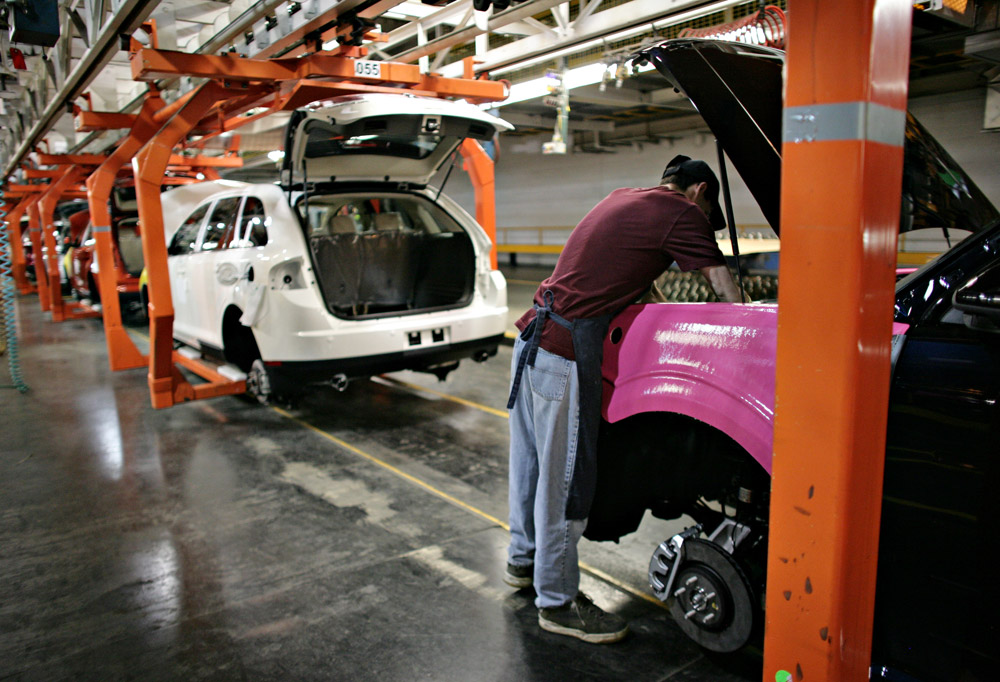Canadian taxpayers are giving Ford Motor Co. more than $140-million towards its revamped operations in Oakville, Ont., which is expected to create 1,000 direct new jobs.

About $71 million of that is from the Ontario government; $71.6 million is from the federal government, under the Automotive Innovation Fund, introduced in 2008 and renewed last year, which is meant to provide “support for leading-edge innovation in automotive manufacturing and research and development (R&D) to build advanced, greener products and processes.”
That works out to about $140,000 per job.
(The federal government takes issue with this characterization – a spokesperson for Industry Minister James Moore called it “misleading” – arguing the money also covers indirect benefits, which could mean an additional four jobs created for every one Ford adds. If that were used in the calculation, the $140-million investment would create about 5,000 jobs, at a cost of $28,000 each.)
READ MORE: Ontario gave 109 companies $765M over eight years. So where are the jobs?
“It makes sense, when you have these laid off auto workers who probably aren’t going to find a job somewhere else, it may just be easier and cheaper for the government to finance this company’s operations,” said Mike Moffatt, a Western University economist and chief economist at the Mowat Centre.
“That is an awful lot of money to be creating 1,000 direct jobs.”
And neither the province nor the federal government will say what conditions, if any, are attached to that deal. It’s a trade secret, they say.

Get weekly money news
That secrecy makes it almost impossible to determine whether that $140 million is taxpayer money well spent, Moffatt said. And there’s no indication it’s necessary, from a market competition perspective.
“But this blanket of keeping everything secret tends to be used very widely more to reduce the amount of scrutiny on these deals, ’cause it’s really hard for an independent guy like me to be able to do the math on these without knowing the terms of the deal.
“It reduces the amount of scrutiny on both the company and the government.”
Andrew Forgione, spokesperson for Brad Duguid, Ontario Minister of Economic Development, Employment and Infrastructure, said Ford approached both the province and the federal government about funding last year.
“Ford makes a significant contribution to Ontario’s automotive sector, and we remain committed to partnering with Ford and all auto businesses to ensure the long-term success of the auto industry in Ontario. That’s why our government has made strategic investments in Ford Canada to upgrade the company’s Oakville Assembly plant,” Forgione wrote in an emailed statement.
“As with all of our investments in key sectors across Ontario, we always work to ensure we receive the best value for Ontario taxpayers. Whenever we provide funding to a company – whether in the form of a grant or loan – the contract contains milestones, deliverables and timelines that have to be met by the company. Clawback provisions also exist should those targets not be met.
“Projects are closely monitored over their lifespan to protect taxpayers’ investment and the province will only make disbursements subject to meeting agreed to performance targets, including thresholds for job creation and investment. Clawback mechanisms further protect taxpayers investments in the event that a company is unable to maintain its jobs or investment commitments after funding has flowed.”
But he wouldn’t say what the conditions, milestones, deliverables or timelines are for this agreement: That’s confidential.
Ottawa’s announcement of its investment says it expects Ford’s investment in Oakville to reach “up to” $716 million, including up to $51 million in “new Canadian-based” research and development that will “advance the government’s science and technology agenda.” There’s no mention of the kind of jobs this investment is expected to create, for how long and under what conditions, salary or benefits.
The federal government said its agreement is also secret.
“That’s hogwash,” said Carleton University public policy professor Robert Shepherd. “If a deal has been finalized, then the conditions or the results of the deal are open – just like any other negotiation with any other plant. … These are not exceptional events.
“If any taxpayer money is going into these things, we want to know how our taxpayer dollars are used.”


Comments